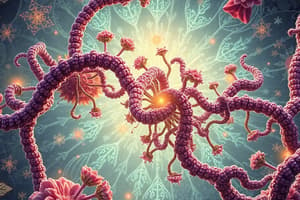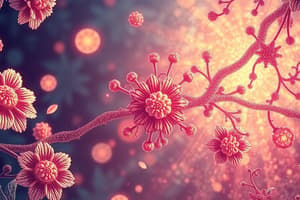Podcast
Questions and Answers
What is the term for drugs that produce the desired physiological response after binding with receptors?
What is the term for drugs that produce the desired physiological response after binding with receptors?
- Non-competitive antagonist
- Partial agonist
- Agonist (correct)
- Antagonist
Which type of drug binds to receptors and reduces the response, leading to a sub-maximal effect?
Which type of drug binds to receptors and reduces the response, leading to a sub-maximal effect?
- Agonist
- Antagonist
- Non-competitive antagonist
- Partial agonist (correct)
What is the characteristic of a competitive antagonist when binding to receptors?
What is the characteristic of a competitive antagonist when binding to receptors?
- Is overpowered and removed by agonist (correct)
- Remains in the receptors regardless of agonist amount
- Binds irreversibly
- Reduces the physiological response
Which type of drug binds irreversibly to the site of action, regardless of the amount of agonist present?
Which type of drug binds irreversibly to the site of action, regardless of the amount of agonist present?
What do drugs that act as antagonists do?
What do drugs that act as antagonists do?
What is the term used for drugs that bind to specific receptors and reduce the response, leading to a sub-maximal effect?
What is the term used for drugs that bind to specific receptors and reduce the response, leading to a sub-maximal effect?
Which type of antagonist binds in a way that can be overpowered and removed by an increasing amount of agonist?
Which type of antagonist binds in a way that can be overpowered and removed by an increasing amount of agonist?
What type of drug binds irreversibly to the receptor site and remains attached regardless of the amount of agonist present?
What type of drug binds irreversibly to the receptor site and remains attached regardless of the amount of agonist present?
Which term describes drugs that produce the desired physiological response after binding with receptors?
Which term describes drugs that produce the desired physiological response after binding with receptors?
In pharmacodynamics, what do we call drugs that stop or reduce the physiological response to agonists?
In pharmacodynamics, what do we call drugs that stop or reduce the physiological response to agonists?
Study Notes
Pharmacodynamics
- Pharmacodynamics studies how drugs interact with the body and receptors.
- A drug molecule binds to specific receptors depending on the function of the cell it alters.
Drug Types
- Agonist: produces the desired physiological response after binding with a receptor, resulting in a maximal physiological response.
- Partial Agonist: binds to the receptor site, reducing the response and the effects of other similar agonists, resulting in a sub-maximal response.
- Antagonist: administered to stop or reduce the physiological response to an agonist, without producing a response itself.
Antagonist Subtypes
- Competitive Antagonist: binds temporarily or reversibly, can be overpowered and removed from the receptors if the agonist increases.
- Non-Competitive Antagonist: binds irreversibly to a site of action, remaining in the receptors regardless of the amount of agonist administered.
Studying That Suits You
Use AI to generate personalized quizzes and flashcards to suit your learning preferences.
Description
Test your knowledge on pharmacodynamics and how drugs interact with receptors in the body. Learn about different types of drugs such as agonists, partial agonists, and antagonists, and understand their effects on physiological responses.




